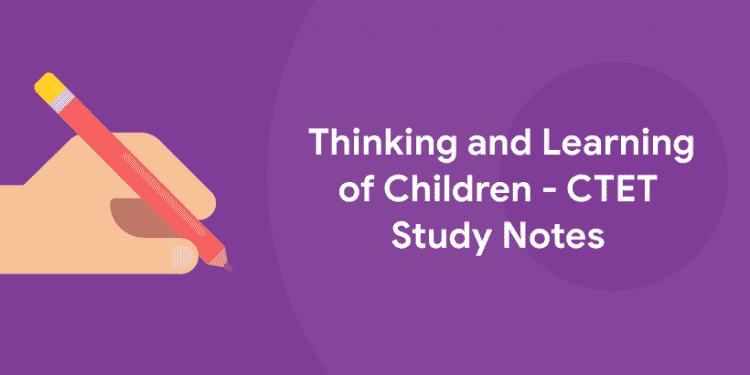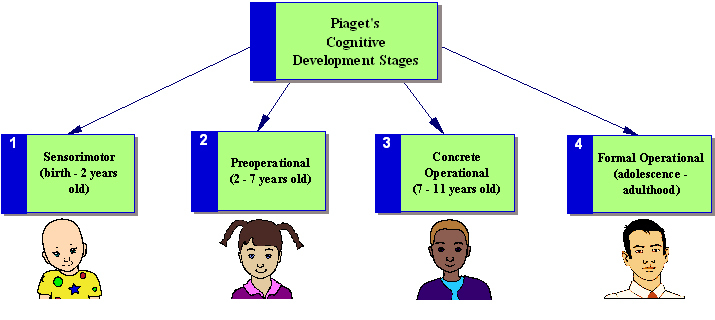Although children are born with some inherited tendencies, an environment that stimulates learning and development is necessary to ensure children reach their learning potential. Adults play a vital role in providing stimulation and support for children’s learning. Parents and carers can nurture children’s development through understanding the importance of what children experience in the world around them, and providing experiences that arouse their curiosity and interest. In this blog, we include the CTET study notes on the Thinking and Learning of Children.
Ace your preparation with the Entri app
There are many important theories and approaches on how to make learning effective for kids. One of the most important theories is Piaget’s theory of Cognitive Development.
According to Piaget, cognitive development progresses through four major stages:
(i) Sensory-motor (birth to 2 years):
The sensory-motor stage is characterized by the reflex actions of the infants. Children are using their physical or motor skills and their senses to explore their world and develop their cognitive understandings.
(ii) Preoperational (2 to 7 years)
(a) Preoperational (2-4)
(b) Intuitive (4-7)
Children during this period are egocentric and do not have the concept of object permanence. 2 to 7 years. In this stage, children are less reliant upon senses and physical exploration and, according to Piaget, are ‘illogical thinkers’. During this stage, for example, children can be shown that two balls of dough are exactly the same size, and they will agree that the balls are the same size, but when one is flattened, they will usually tell you that one of them is now bigger. This inability to conserve is a feature of the preoperational stage.
(iii) Concrete operations (7 to 12 years)
7 to 12 years. In this stage, which aligns with middle childhood, children are beginning to be able to demonstrate much more logical thinking, although they need concrete materials to help them reach the correct conclusions. Thus in this stage, you will see children working on mathematical problems but using blocks, counters, or even their fingers to help them work out the answer. Children of this age are able to differentiate themselves from the environment, learn about object permanence, and do goal-directed behaviors. They can arrange things or objects in a sequence.
(iv) Formal operations (12+years)
12 years and over. This final stage encompasses the rest of our lives. Piaget believed that once we reached the age of 12 we were capable of much more abstract thinking and able to solve problems in our ‘heads’. We can deal with much more complex issues. During this period, children are able to do abstract reasoning and are able to think like adults.
The Basis of Thinking –
Thinking is a complex process that involves the manipulation of information as we form concepts. It also engages in problem solving, reasoning, and making decisions. Thinking is a higher cognitive function and the analysis of thinking processes is part of cognitive psychology. Thinking is a pattern of behavior in which we make use of internal representations (symbols, signs, etc.) of things and events for the solution of some specific, purposeful problem.
HOW CHILDREN THINK AND LEARN?
Expression – When a child perceives an object in its physical environment rather than observing just the object along, this helps the child to think and develop a notion about it.
Fascination – A child develops a fascination for increasing his learning even if the object isn’t observable.
Conceptualization – Here the child develops concepts about the fundamentals that should be known in life say weight, time, distance, etc..
Experience – Good or bad, every incident that happens in life makes an impact on how the child assesses and think about future problems.
Curiosity – Child develops a new way of thinking based on their interests and desires. At an early age, they are curious about everything around them. Parents and teachers must ensure that they encourage kids in all the stages to remain curious about happenings in their surroundings.
Copying – Childs imitate their elders. From the day they are born, their 1st school is home, and the people and surroundings at home influence their character a lot.
Logic and Reasoning – Logical thinking develops when the child starts to learn languages. It is the highest level of thinking and the child requires a strong thinking capacity to tackle the problems that come on the way. This is mostly taught in schools and colleges.
A few other techniques to develop thinking capacity are:
- Use analogies while learning. This will help them understand the concept from a wider perspective.
- Promote interaction among students. Discussing with students helps figure out the diverse views on a single topic. Each of them thinks differently and finding a new idea from our friends opens up a huge gateway to think in that way.
- Ask open-ended questions. This will help kids think bigger. Ask them to find multiple answers for the questions rather than one simple conclusion.
- Allow reflection time. Taking time to reflect means slowing down enough to stop, enjoy the adventure, and figure out what is really important to YOU. Learn what you like and dislike. Do something for fun… for you. All of this reflection may actually help you plan for the future
- Use real-life problems. This will help kids get a perfect idea about how to think forward because real-life problems are those happening around them
- Allow for thinking practice. There are many ways to practice thinking. Say, READING. This is very effective in improving thinking capacity. While reading we imagine the entire plot in our mind and this is an exercise to our brain. Yet another effective way is solving Puzzles, sudoku, Rubik’s cube, etc..
Why do students fail to succeed in school?
1. Poor time management skills and procrastination.
Most teachers know when a student has rushed through a project or essay. Students who routinely wait until the last minute to complete assignments will submit substandard efforts and achieve poor performance on exams.
2. An inability to complete tasks.
Students must be encouraged to be thorough in every task and not to quit until it is done. Help your child identify the areas that are giving them problems and don’t empower them to seek extra help in school, as need. Preach to your child that he cannot be too quick to give up or put off an arduous task until it becomes impossible to complete.
3. Fear of failure and lack of self-confidence.
A lack of self-esteem or confidence can prevent a student from building on his or her strengths. Too much confidence can prevent a student from acknowledging and improving on weaknesses. For some children, the very thought of not being able to succeed is enough to stop them from attempting at all. From the earliest age, children must know that we all learn from our failures and then move on. All new skills require practice and repetition before they can be mastered.
4. Too Much Reliance on Others.
Encourage your child to develop academic independence and accountability from the moment they enter school. Each child must know he or she is responsible for their own learning: completing all tasks and assignments; bringing the right books and equipment to every class; and taking everything home each night.
5. Lack of Desire.
Many students are underachievers; although capable of completing their schoolwork, they lack the initiative or motivation to succeed. These are students that can do the work, are highly intelligent, but have decided that there are other things that are more important. In many cases they are distracted by outside factors, emotional issues, or are not challenged enough in school.
How to cope up with failure and learn from them?
Teach the students that failures are a part of life. We need to derive the best of them and ensure they don’t repeat again. Look at the positive outcomes obtained and enjoy them. In schools, ensure that parents and teachers take adequate steps to develop basic skills in kids such as reading, writing, drawing, etc,. They should create a stable environment around the kid to boost learning.
Check out the CTET notes on Important Theories on child development here
The exam is fast approaching. Ensure you cover all the topics and don’t miss this golden opportunity. We the Entri team is all set to guide you at each stage in the preparation and selection process. Attend our classes on child psychology to understand the exam pattern trend and to cover the most important topics. All the best to all the aspirants.













